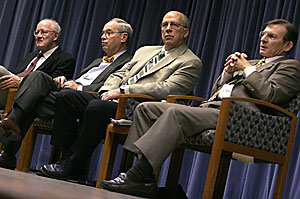 |
|
JACOB KONST/Arizona Daily Wildcat
|
UA administrators address issues on the expansion of the College of Medicine to Phoenix Friday at a Campus Town Hall meeting.
|
|
|
By Natasha Bhuyan
Arizona Daily Wildcat
Monday, February 14, 2005
Print this
With the expansion of the UA College of Medicine to Phoenix, the university could open admissions to nonresidents in the future, officials said Friday.
Kenneth Ryan, dean for academic affairs in the College of Medicine, said in order to maintain the quality of students in medical school, the UA will consider allowing out-of-state students to apply in a few years.
Although the Phoenix campus will open in July 2006 with class sizes of 24 students, Ryan said the figure could eventually reach 110 students, matching the Tucson campus population.
With about 500 students applying to the UA College of Medicine each year, Ryan said accepting 220 from Arizona alone might not be reasonable.
In addition, Ryan said College of Medicine degree programs do not receive federal funding from the National Institutes of Health, such as an M.D. and a Ph.D., since the medical school is only open to Arizona residents.
At the same time, it would not make sense to allow nonresidents into a school funded by state resources, said Ryan.
Ryan joined President Peter Likins, Provost George Davis and Arizona Board of Regents President Gary Stuart at a Campus Town Hall meeting Friday regarding the expansion of the College of Medicine into Phoenix.
Other changes students may see at the Phoenix campus is a revamped curriculum, with the utilization of different technologies and learning methods, Ryan said, which would help students better prepare for medical challenges.
The restructured curriculum would be part of the materials submitted by the UA to the Liaison Committee on Medical Education, who will perform an accreditation review on the College of Medicine in November.
The Phoenix and Tucson campuses will have a common application, but the admissions board will most likely give students a chance to list their preferred campus.
The option is currently available to third- and fourth-year medical students, since 40 percent of Tucson medical students do their rotations in Phoenix, Ryan said.
The UA College of Pharmacy will also expand to Phoenix, with space from the new Transnational Genomics Research Institute headquarters, Likins said, where the university faculty could aid TGen researchers in getting drugs to patients.
As the College of Pharmacy ranks second in the nation for research funding, Davis said the expansion would be advantageous to society since there is a shortage of graduates from pharmacy.
"We're not just talking Walgreens here," Davis said.
A large part of the medical school's success depends on the ability to collaborate with other entities, such as hospitals and research institutes, Likins said.
The Phoenix campus will even include joint faculty from the UA, Arizona State University and TGen.
"It's a beautiful idea," Likins said. "It's enabled us as a state to draw upon resources we would otherwise not be able to absorb."
The panelists answered questions regarding the budget for the Phoenix campus, which has yet to be determined, although the state, hospitals and the private sector are being considered as sources.
Likins said financially, Arizona would benefit from the project. The expansion would promote strategies of advanced medicine, help the state be more competitive in the international arena and focus faculty from different fields into a single campus, he said.
"The budget should follow the thinking, not the other way around," Likins said.
When asked how the university would implement the plan in the long run, Likins said the Phoenix campus would begin with an initial $6 million for the first class in addition to private funding, then ask the state for additional funds once the program was established.
Although about 80 people attended the forum Friday, only 15 of them were students.
Robert Kaufman, president of the pre-medical honorary Alpha Epsilon Delta and a biochemistry and molecular biophysics senior, said he was disappointed with the forum because the panelists only "scratched the surface" of student concerns, and many questions remained unanswered.
However, Stuart said answers must come soon, as the Arizona Commission on Medical Education and Research will present their recommendations for the new school in March, with accreditation of the Tucson campus in November and the first class kicking off in July 2006.
